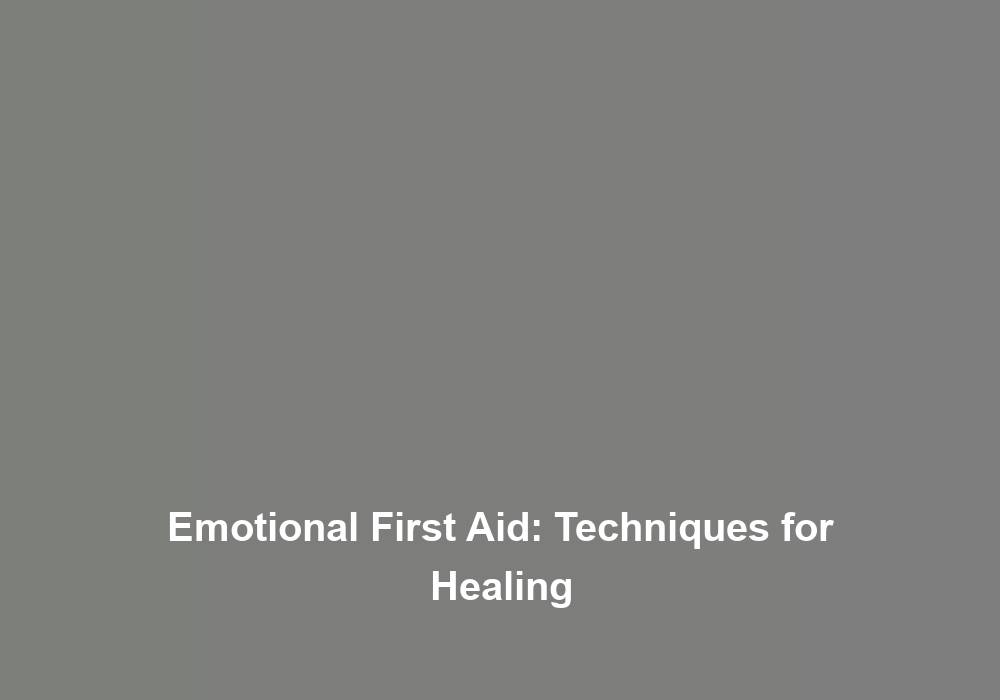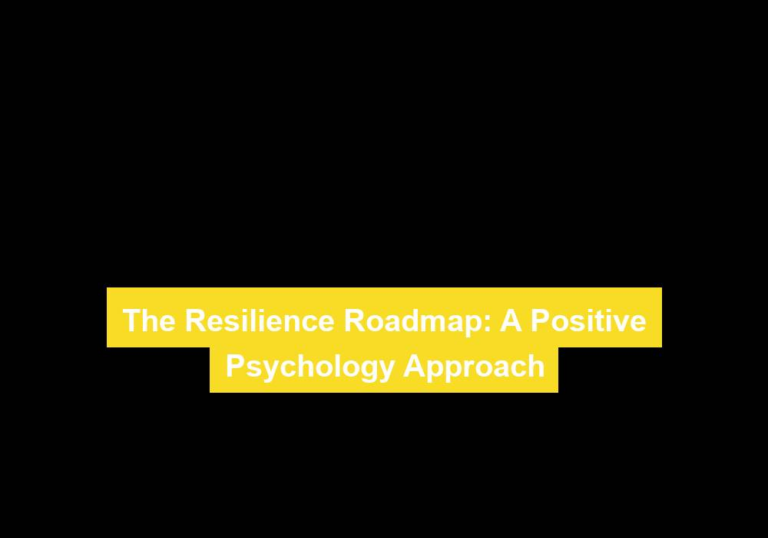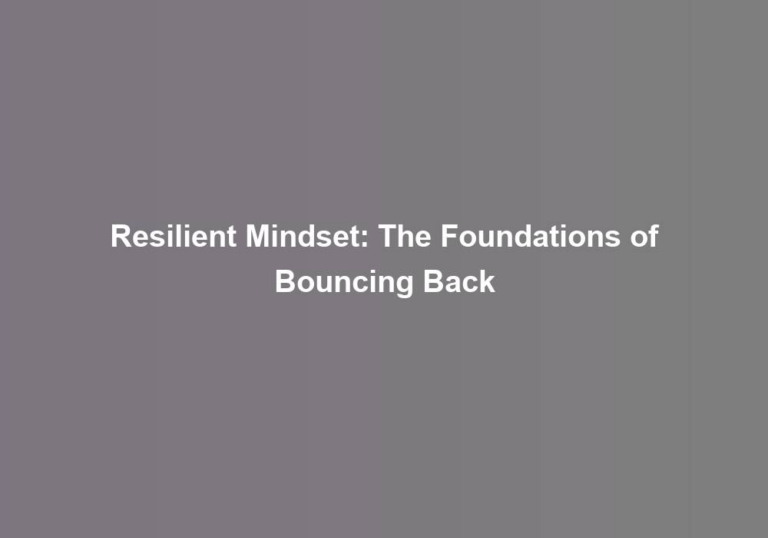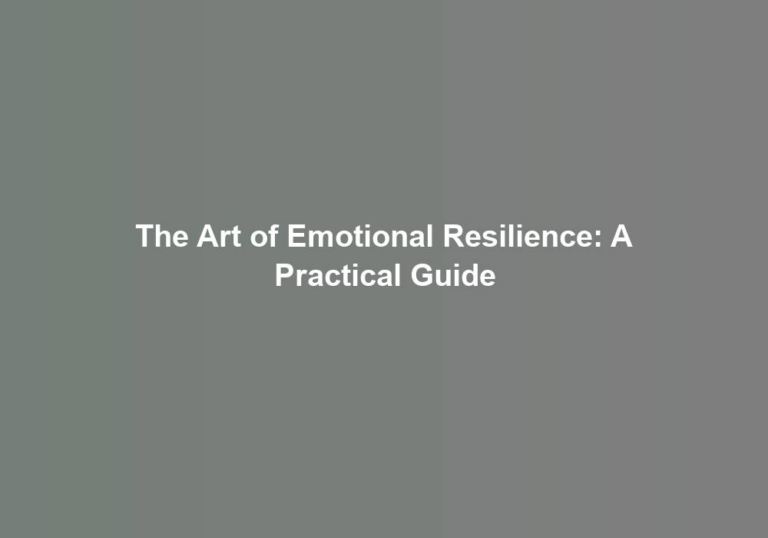Emotional First Aid: Techniques for Healing
When life throws you unexpected storms, itG??s important to have the tools to weather the emotional turbulence. Emotional First Aid is like a gentle balm for the wounds we cannot see, offering techniques for healing and resilience. In this discussion, youG??ll uncover practical strategies to navigate through difficult emotions and nurture your mental well-being. These techniques not only provide immediate relief but also empower you to build emotional strength for the future. So, are you ready to discover how to cultivate emotional resilience and find inner peace?
Understanding Emotional First Aid
Understanding Emotional First Aid can help you navigate and address emotional distress in a healthy and effective manner. When it comes to emotional healing and mental wellness, having a strong understanding of emotional first aid is crucial. ItG??s like having a toolbox of strategies and techniques to help you address and manage emotional challenges that may arise in your life. This understanding empowers you to take control of your emotional well-being and respond to distress in a constructive way.
One key aspect of understanding emotional first aid is recognizing the importance of addressing emotional wounds as seriously as physical injuries. Just as you would clean and dress a physical wound, itG??s essential to tend to emotional wounds with care and attention. This mindset shift can significantly impact how you approach and prioritize your mental wellness.
Understanding emotional first aid also involves learning specific techniques for managing and alleviating emotional distress. These techniques can range from mindfulness practices and deep breathing exercises to seeking support from trusted individuals. By familiarizing yourself with these techniques, you can build a toolkit for promoting your emotional healing and maintaining mental wellness.
Practicing Self-Compassion
You deserve kindness and compassion, especially from yourself. ItG??s important to practice self-care and prioritize your well-being. LetG??s explore how you can cultivate self-compassion and make it a part of your daily life.
Kindness Towards Self
Practicing self-compassion is an essential aspect of emotional first aid, allowing you to acknowledge and soothe your own emotional pain with kindness and understanding. ItG??s important to prioritize self-care techniques and self-kindness practices to nurture your emotional well-being. Start by being mindful of your inner dialogue. When you make a mistake or face challenges, respond to yourself with the same empathy and encouragement you would offer a friend. Practice self-kindness by treating yourself with the same warmth and care you would show to someone you love. Remember that itG??s okay not to be perfect and that self-compassion involves recognizing your humanity. By embracing self-compassion, you can cultivate a more nurturing and supportive relationship with yourself, fostering emotional resilience and well-being.
Self-Care Practices
Acknowledging and soothing your own emotional pain with kindness and understanding is essential, and now weG??ll explore self-care practices that focus on practicing self-compassion. When it comes to self-care rituals, prioritizing self-compassion can greatly impact your emotional well-being. Here are some effective practices to consider:
- Self-compassionate self-talk: Engage in positive and reassuring self-talk to counter negative thoughts.
- Mindfulness meditation: Take time for mindfulness practices to cultivate self-compassion and self-awareness.
- Self-care activities: Incorporate activities that bring you joy and relaxation into your routine.
- Setting boundaries: Learn to say no when needed and prioritize your own well-being.
Building Resilience
YouG??ve been through tough times, and itG??s okay to feel overwhelmed. But building resilience is about finding healthy ways to cope and bounce back. By practicing stress coping strategies, developing a positive mindset, and learning to navigate adversity, you can strengthen your ability to face challenges and grow from them.
Stress Coping Strategies
Facing lifeG??s challenges can be overwhelming, but developing resilience through stress coping strategies can help you navigate through difficult times with strength and determination. When you feel stressed, try these techniques:
- Mindfulness Meditation: Engaging in mindfulness meditation can help you stay present and focused, reducing the impact of stress on your mental well-being.
- Deep Breathing Exercises: Taking deep, intentional breaths can activate the bodyG??s relaxation response, calming your mind and body in times of stress.
- Physical Activity: Engaging in regular physical activity can help reduce stress and improve your overall mood and resilience.
- Seeking Support: Talking to a trusted friend, family member, or mental health professional can provide comfort and perspective during challenging times.
Positive Mindset Development
Developing a positive mindset is key to building resilience in the face of lifeG??s challenges. When you actively develop gratitude, you shift your focus from whatG??s lacking to what you appreciate, fostering a positive outlook. Mindfulness techniques, such as deep breathing and meditation, can help you stay present and manage stress more effectively. By practicing gratitude and mindfulness, you can reframe negative situations, finding opportunities for growth and learning. Remember, resilience isnG??t about avoiding difficulties but rather about bouncing back from them. Cultivating a positive mindset doesnG??t mean ignoring difficulties; it means approaching them with an optimistic and proactive attitude. By developing gratitude and mindfulness techniques, you can build your resilience and face lifeG??s challenges with a strong and positive mindset.
Adversity Resilience Building
When confronted with lifeG??s adversities, actively cultivating gratitude and practicing mindfulness techniques can serve as the foundation for building resilience and facing challenges with a positive and proactive mindset. Building resilience is an ongoing process that requires dedication and self-awareness. Here are some techniques to help you overcome challenges and develop resilience:
- Self-compassion: Treat yourself with the same kindness and understanding you would offer to a friend in a similar situation.
- Seeking support: Connect with friends, family, or a support group to share your feelings and gain perspective.
- Goal setting: Break down challenges into manageable steps and set achievable goals to maintain a sense of control.
- Adaptability: Embrace change and cultivate a flexible attitude, allowing yourself to adjust to new circumstances.
Cultivating Emotional Awareness
Take the time to tune into your emotions, allowing yourself to recognize and understand what you are feeling in the present moment. Cultivating emotional awareness is essential for your well-being and personal growth. Mindfulness practice is a powerful tool to enhance emotional awareness. Engage in activities such as meditation, deep breathing, or yoga to bring your focus to the present and observe your emotions without judgment. By practicing mindfulness, you can develop a deeper understanding of your emotional responses and improve your emotional regulation skills.
Self-reflection is another crucial aspect of cultivating emotional awareness. Take moments throughout your day to reflect on your emotions, their triggers, and how they influence your behavior. Journaling can be an effective way to facilitate this process. Write down your thoughts and feelings, and try to identify any recurring patterns or underlying causes of your emotions. This self-reflective exercise can help you build empathy towards yourself and others. As you become more aware of your own emotions, you may find it easier to understand and relate to the emotions of those around you.
Remember that cultivating emotional awareness is a journey, and itG??s okay to take it one step at a time. Be kind to yourself as you navigate through this process. Developing a greater understanding of your emotions can lead to improved mental and emotional well-being, as well as stronger, more meaningful connections with others.
Nurturing Positive Relationships
To foster positive relationships, itG??s important to nurture open communication and mutual understanding. Building and maintaining healthy relationships requires effort and commitment. Here are some key techniques to help you nurture positive relationships:
-
Establish Healthy Boundaries: Setting clear boundaries is essential for maintaining healthy and balanced relationships. ItG??s important to communicate your needs and expectations openly while respecting the boundaries of others. This ensures that both parties feel valued and respected within the relationship.
-
Practice Effective Communication: Effective communication is the cornerstone of any healthy relationship. This involves active listening, expressing your thoughts and feelings clearly, and being open to feedback. By fostering open and honest communication, you can deepen your understanding of each other and strengthen your connection.
-
Cultivate Empathy and Understanding: Empathy plays a crucial role in nurturing positive relationships. By putting yourself in the other personG??s shoes and seeking to understand their perspective, you can build a deeper sense of connection and mutual support.
-
Celebrate and Support Each Other: In healthy relationships, itG??s important to celebrate each otherG??s successes and provide support during challenging times. Showing genuine interest in each otherG??s accomplishments and being a source of encouragement fosters a positive and uplifting dynamic.
Seeking Professional Support
If you find yourself struggling to navigate challenges within your relationships, seeking professional support can offer valuable guidance and insight. Professional counseling and therapy options can provide a safe and supportive environment for you to explore your emotions, gain clarity, and develop healthy coping mechanisms. Here is a table that outlines different therapy options to help you make an informed decision:
| Therapy Type | Description |
|---|---|
| Individual Therapy | One-on-one sessions with a therapist to address personal challenges, mental health concerns, and relationship issues. |
| Couples Therapy | A form of psychotherapy that helps couples identify and resolve conflicts to improve their relationship. |
| Family Therapy | Involves family members in therapy sessions to address communication issues, conflicts, and behavioral patterns. |
| Group Therapy | Conducted with a group of individuals dealing with similar issues, providing a supportive environment for sharing and learning from others. |
| Online Therapy | Offers the flexibility of virtual sessions, allowing individuals to access professional support from the comfort of their own space. |
These therapy options can empower you to work through emotional challenges, gain perspective, and develop effective strategies for healing and growth. Remember that seeking professional support is a courageous step towards prioritizing your emotional well-being. It is okay to ask for help, and professional support can provide the guidance and tools you need to cultivate healthier and more fulfilling relationships.
Conclusion
As you navigate the ups and downs of life, remember that emotional first aid is just as important as physical first aid. Just as a bandage can heal a wound, practicing self-compassion, building resilience, and nurturing positive relationships can mend emotional scars. Like a gardener tending to a delicate flower, cultivate emotional awareness and seek professional support when needed. By taking care of your emotional well-being, you can thrive and bloom like a beautiful garden in full bloom.







